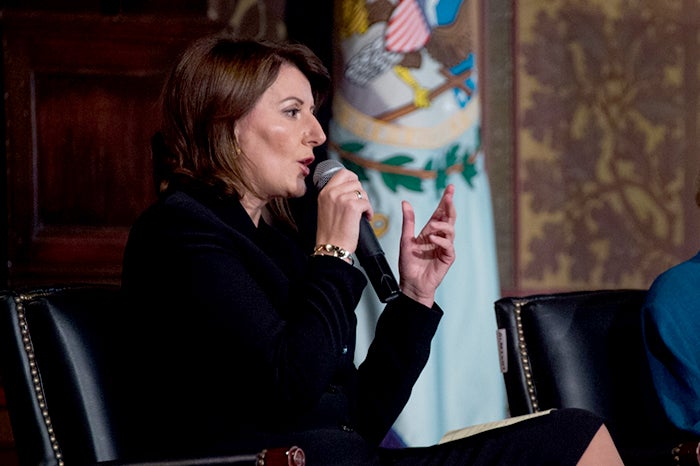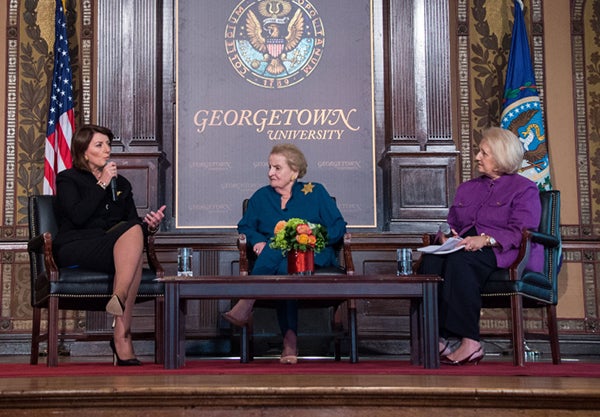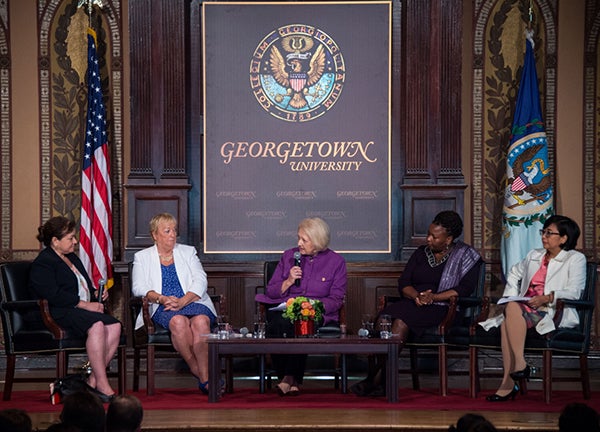Title: President of Kosovo, Panelists Explore Impact of Women in Peace Processes
Kosovo President Atifete Jahjaga, former U.S. Secretary of State Madeleine Albright and a panel of global peacebuilders explore the impact women are making in the political peace process during a symposium at Georgetown.

The women of Kosovo helped rebuild the country during its democratic transition, President Atifete Jahjaga said yesterday at a Georgetown symposium on women’s political participation in peace processes.
“Women in Kosovo played a crucial role in achieving peace and rebuilding the nation,” Jahjaga said during the Sept. 30 symposium sponsored by the Georgetown Institute for Women, Peace and Security (GIWPS). “They mobilized as healers, researchers, activists and peacemakers.”
“It is essential that women are involved across the board,” she added. “When women are involved economically and politically, societies are more stable.”
Former U.S. Secretary of State Madeleine Albright echoed the Kosovo president’s sentiments.
“It’s important to have more than one woman in the room,” said Albright, Georgetown’s Michael and Virginia Mortara Distinguished Professor of Diplomacy. “Having women [involved in public life] is a basic part of democracy.”
“Women Leading Peace” Research

Kosovo President Atifete Jahjaga, left, former U.S. Secretary of State Madeleine Albright and Melanne Verveer, executive director of Georgetown Institute for Women, Peace and Security, discuss the role of women in the peacemaking process.
New research released by GIWPS at the symposium yesterday “demonstrates that women can and do make important contributions to the attainment of peace,” said Melanne Verveer, executive director of GIWPS.
The report “Women Leading Peace: A Close Examination of Women’s Political Participation in Peace Processes in Northern Ireland, Guatemala, Kenya, and the Philippines,” examines women’s political participation in peace processes, focusing on four cases where women have gained access to high-level official negotiations.
Made possible through a grant from the Ford Foundation, the report provides a comprehensive literature review and draws lessons learnedfrom nearly 100 in-depth, face-to-face interviews. It is a unique resource for women currently engaged in peace activism in conflict settings, as well as representatives of international institutions promoting peace and security the world over.
“Women across the globe continue to face significant cultural, institutional and structural barriers to meaningful political participation, and these barriers are even greater in countries mired in conflict,” said Verveer, who previously served as the inaugural U.S. Ambassador for Global Women’s Issues. “However, there are countless examples of women who have organized and mobilized in the pursuit of peace for the betterment of their countries.”
Building Peace Around the World
Following the keynote discussion with Jahjaga and Albright on the power and influence of women in peace and security processes, four peacebuilders from across the globe talked about their experiences in their respective home countries.
Panelists included Monica McWilliams, a professor with the Transitional Justice Institute at the University of Ulster in Northern Ireland; Claudia Paz y Paz, former attorney general of Guatemala; Njeri Kabeberi, executive director of the Center for Multi-Party Democracy in Kenya; and Miriam Coronel Ferrer, the first female chair of the Government of the Philippines Peace Panel.
McWilliams said she drew from her own experience when forming the Northern Ireland Women’s Coalition.
“We were all from diverse backgrounds,” she said. “But the one thing we all had in common is we were all fed up with conflict. We became accidental activists – this is what conflict does.”
Paz y Paz talked about the role of the women’s movement in Guatemala seeking justice and advised that women should be engaged in politics and peace processes across ethnic and social groups.
“To bring justice for women survivors, it is important to have women in political positions,” she added.
Commemorating and Advancing

Melanne Verveer, center, listens to a panel of four women share their involvement with building peace in their countries. Seated from left to right are Claudia Paz y Paz, former attorney general of Guatemala; Monica McWilliams, a professor with the Transitional Justice Institute at the University of Ulster in Northern Ireland; Njeri Kabeberi, executive director of the Center for Multi-Party Democracy in Kenya; and Miriam Coronel Ferrer, the first female chair of the Government of the Philippines Peace Panel.
The report and symposium took place as the international community is commemorating the 20th anniversary of the adoption of the Beijing Declaration and Platform for Action, considered one of the most progressive blueprints for advancing women’s rights.
This month is also the 15th anniversary of the adoption of U.N. Security Council Resolution 1325, which recognized the disproportionate burden placed on women during violent conflicts and reinforced their indispensable role as agents of peace.
Still Speaking
Kabeberi said she faced backlash for standing up for peace during the violence following the 2007 elections in Kenya.
“The more I was threatened, the more I spoke out,” she said. “Here I am, seven years later, still speaking.”
Coronel Ferrer is the first female chief negotiator to sign a final peace accord with a rebel group – the Moro Islamic Liberation Front.
“Women’s participation in peace should be meaningful, and women should define what that means.”